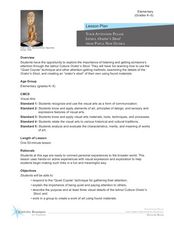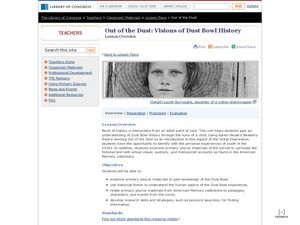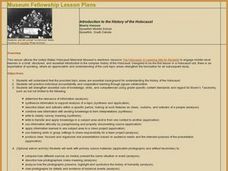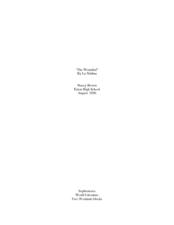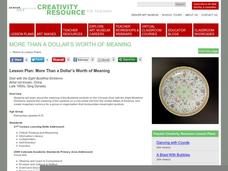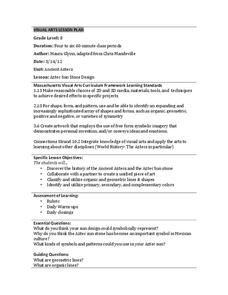Curated OER
Your Attention Please: Iatmul Orator's Stool
Students investigate art by observing historical sculptures from New Guinea. In this art history lesson, students observe pictures of the "Orator's Stool"from Papua New Guinea, while identifying the small details that make it unique....
Curated OER
Animal Self-portrait Mosaics: A Visual Arts Elective
Out-lined here is a two-week procedure that has the class creating ceramic animal tiles that are metaphorical representations of their own personalities. They discuss animal images found throughout history, what they mean, metaphor, and...
Smithsonian Institution
Spirits Across the Ocean: Yoruban and Dahomean Cultures in the Caribbean Brought by the Slave Trade
Much of Latin American music owes its origins to the slave trade. Peoples from the Yoruban and Dahomean cultures brought with them the distinctive rhythms, time signatures, and eighth note patterns that now characterize Caribbean music....
Smithsonian Institution
Art to Zoo: Life in the Promised Land: African-American Migrants in Northern Cities, 1916-1940
This is a fantastic resource designed for learners to envision what it was like for the three million African-Americans who migrated to urban industrial centers of the northern United States between 1910 and 1940. After reading a...
Curated OER
Lesson: Storyboarding Revolution
Kids consider revolution as a basis for creativity, art, and storytelling. After reading an excerpt from the book, Persepolis, learners choose one event from any world revolution to write about. They storyboard the event focusing on...
Curated OER
Out of the Dust: Visions of Dust Bowl History Lesson Overview
Students complete activities with the book Out of the Dust by Karen Hesse. In this literature activity, students read this story and view the Dust Bowl history from the eyes of a child. They discover the Great Depression and life in...
Curated OER
Homes of the World: Ceramic Lesson
Kids consider the various dwellings humans inhabit all over the world. They choose a home from anywhere in the world. Then they research the type of materials, designs, and structures need to build that type of home. The project ends...
Curated OER
Egyptian Relic: Ceramics Lesson
Egyptian artwork is inspiring in so many ways. Learners discover the world of Egyptian relics as they make a ceramic version of their own. Multiple resource links and full instructions make this a fun and easy-to-incorporate art project...
Curated OER
Introduction to the History of the Holocaust
The Holocaust is unbelievable! Examine this piece of history with your class. Using the Internet, research groups determine the relevance of information presented, compare how different sites present the same information, synthesize...
Curated OER
Rediscovering Forgotten Women Writers
Women's voices are becoming more prominent in the world of literature, but for centuries, this wasn't the case. Young historians research a woman whose writings are considered to be lost, out of print, or forgotten. They develop an oral...
Curated OER
World Literature: “The Wounded” By Lu Xinhua
“The Wounded,” the title story from a collection of stories about the Chinese Cultural Revolution (1977-78), is the central text in a World Literature unit examining choices. An anticipation guide, discussion topics, vocabulary list,...
Curated OER
Lesson: More Than a Dollar's Worth of Meaning
The Chinese, Dish with the Eight Buddhist Emblems contains symbols and visual references for learners to explore. They search for Buddhist symbolism on the dish and then they use their observation skills to locate and explore...
Curated OER
To the North: A Black Family Leaves Arkansas to Find Work in Michigan
Upper elementary and middle school scholars study the economic factors that caused so many Arkansans to migrate to different parts of the country looking for work. Use this history lesson plan to help your charges gain a better...
Curated OER
How Do Artists Effectively Relate Historic Events?
Learners explore African American migration. For this black culture and history lesson, students use a map to identify northern and southern states in which African Americans lived in the 1900s. Learners observe and describe objects and...
Curated OER
From The Great War To The Great Depression
Discover details about 1920's America. In this American history lesson, students read From the Great War to the Great Depression. Students then research famous Americans from the time period and present their findings to their classmates.
Museum of Disability
Taking Visual Impairment to School
What is the world like when you can't see, or when your vision is impaired? Learn about how Lisa communicates with the world around her with Taking Visual Impairment to School by Rita Whitman Steingold. Learners answer...
K20 LEARN
Voices from the Past: History and Literature
Art can enhance the understanding of history. That's the big idea in a lesson that has young scholars read Randall Jarrell's poem "The Death of the Ball Turret Gunner" and an excerpt from John Hersey's Hiroshima, which provide a...
Maryland Department of Education
The Concept of Diversity in World Literature Lesson 7: Cultural Commentary
As part of their study of Things Fall Apart, class groups develop a multimedia presentation in response to the question, "In what ways does Achebe use literature as a means to express and comment on culture and history?"
Dick Blick Art Materials
Stitch It Up!
Ever think about combining the art forms of painting and embroidery? Then this art lesson is right up your alley! Given a piece of white cloth, young artists first create a grayscale painting and then highlight certain...
Curated OER
Giving Voice to History
Students examine the plight of Japanese Americans during World War II. For this World War II lesson, students participate in a mock evocation simulation, research primary and secondary documents about internment camps, and share their...
Smithsonian Institution
The Sounds of an Island: Jamaican Music for the Classroom
Introduce young explorers to the music and history of Jamaican culture through game songs and dances. As a bonus, class members get to play simple songs transcribed for the recorder.
Curated OER
Ancient Aztecs
Is it a calendar? A religious symbol? A political statement? One thing for certain is that Aztec sun stone designs remain an important symbol in Mexican cultural art. Young artists craft their own Aztec Sun design incorporating ideas...
Curated OER
Portraits, Pears, And Perfect Landscapes: Investigating Genre in the Visual Arts
Differentiate between the various genres in the visual arts world, particularly in Western painting. Your class can view and discuss, in small groups, paintings published on the National Galleries website. Then each student individually...
Global Oneness Project
Flamenco: A Cross-Cultural Art Form
Notes of pride and persecution, exclusion and isolation resonate in flamenco. Introduce this musical art form to your social studies or Spanish language classes with a resource that follows a young flamenco guitarist as he...


